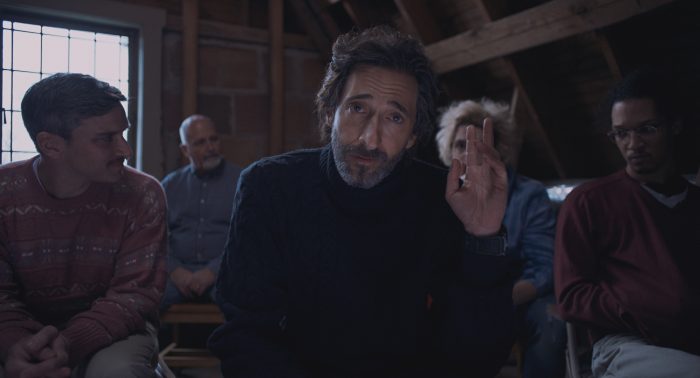Jesse Eisenberg shines in this story of boys masquerading as men. Director John Trengove provides a compelling queer perspective on these male-dominated spaces but too easily forgets the women they define themselves against.
Manodrome tells the fictional story of an all too common phenomenon: the radicalisation of young men who seek easy answers in a complex world. We follow Ralphie (Jesse Eisenberg), a gym rat who is struggling to get by as an Uber driver. He’s expecting a child soon with his girlfriend and it’s all becoming too much. A close-knit group of alienated men are close at hand with easy solutions to his problems.
Sensing Ralphie is circling some kind of drain, his gym buddy Jason introduces him to Dad Dan (Adrien Brody). In Dad Dan, we find an enigmatic father figure who leads a group of dispossessed men at his country retreat. It is through group therapy sessions that he helps these children build new images of themselves as powerful men, masters of their own universe. Ralphie is soon consumed. He’s told that he is beautiful, he is loved, and he has this boundless unbridled power within himself. Ralphie listens and in doing so builds a new image of himself on the weakest of foundations. Manodrome sticks around until it all falls crashing down.
Director John Trengove draws on communities in the “manosphere”: a loosely connected group of online communities. Bringing this nexus of people closer to the physical world, as part of a cult helps, draw us in. Jesse Eisenberg is excellent as the explosive insecure man losing his grip on reality while Adrien Brody pairs the calm of a therapist with a quiet ferocity of purpose.
Trengove offers a unique and compelling interpretation of these male-dominated arenas as queer spaces. Ralphie isn’t just trying to get a foothold on reality but also on his sexuality. Ralphie’s voyeuristic gaze is one part reverence, one part disgust as he watches others in the gym. His eyes fixate on Ahmet (Sallieu Sesay), a factory worker at his gym that projects an assured masculinity of muscle. It becomes a dangerous obsession that’s anchored by a captivating performance from Sesay.
Ralphie’s questions reach fever pitch as his world collapses into one of angry men projecting control; his girlfriend and expected child are soon out of the picture. We see Ralphie’s weakening grip on reality through hallucinations as Manodrome brings these internal states of unreality and projects them onto the world for us all to see. It brings us yet closer to Ralphie’s increasingly warped sense of reality.

However, Manodrome never tackles the misogyny of these groups. Groups in the manosphere are often rampantly misognystic, framing themselves against women and feminism as much as standing for anything themselves. Manodrome offers little acknowledgement and even less insight into this core part of the manosphere, including the cult that Ralphie finds himself in. This is clearest in our limited interactions with Ralphie’s girlfriend Sal (Odessa Young). Odessa Young is strong throughout but her character is tragically under-explored. It’s a missed opportunity and holds back the film from giving wider insight into how these descents impact everyone around them.
Despite this, Manodrome manages to create a wonderfully febrile atmosphere from the start and keep us hooked until the admittedly predictable end. It is largely successful as it tackles the pressing issue of emotionally under equipped men compensating with a brand of hyper-masculinity. Unfortunately, it’s a world where Trengove feels too obviously removed from Ralphie as an individual. We’re left watching him like an animal at the zoo, always a step removed from the action.
Manodrome succeeds most in bringing these online communities into physical groups, interrogating them from a new perspective, and strapping us in for the fast-and-slow car crash that follows. It’s thrilling but lacks insight and always keeps us a step removed from Ralphie’s descent.
